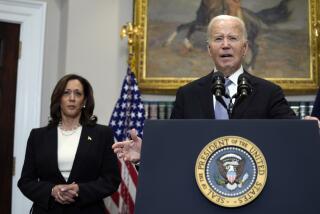Lott Resigns His Post as Senate GOP Leader
- Share via
WASHINGTON — Senate Republican leader Trent Lott, who unleashed a national furor with a racially divisive remark, resigned his post Friday as GOP senators rushed to anoint Sen. Bill Frist of Tennessee his successor.
In a rapid end to a lingering controversy, Frist is expected to be named Senate majority leader Monday by his Republican colleagues for the Congress that convenes in January.
Lott, 61, had maintained for days that he would survive the controversy that engulfed him, encouraged by several prominent senators who stuck by him. But Friday morning -- less than 24 hours after Frist publicly announced a bid for the leadership post -- Lott abruptly abandoned his fight to retain the job.
“In the interest of pursuing the best possible agenda for the future of our country, I will not seek to remain as majority leader of the United States Senate for the 108th Congress,” Lott said in a statement. He said he will keep the Senate seat from Mississippi he has held 14 years.
The White House was given no notice of the announcement, reflecting the strains that had developed between the Bush administration and Lott since the remark that seemed to embrace segregation. President Bush last week sharply criticized Lott’s Dec. 5 remarks as “offensive” and “wrong,” seriously undermining any chance Lott had of riding out the controversy.
Responding to Lott’s resignation, Bush said: “I respect the very difficult decision Trent made on behalf of the American people. Trent is a valued friend, and a man I respect.”
Within hours of Lott’s announcement, all significant opposition to Frist’s candidacy melted away.
Eager to ratify their choice as quickly as possible, the GOP lawmakers moved up an emergency meeting they had planned for Jan. 6. The vote to replace Lott now is scheduled for Monday by conference call.
In turning to Frist, a wealthy former heart surgeon emblematic of a new generation of Southern politicians, Republicans hope to move past questions of their commitment to racial equality that have haunted the party. Frist also is closely allied with the White House.
Frist, 50, praised Lott’s decision. “He has always put concern for his family, country and colleagues first and demonstrated that today,” a statement said.
Frist also acknowledged the high stakes for Republicans, who in January will control both houses of Congress and the presidency. “We all know that we have a unique opportunity to accomplish great things for America during the next few months,” he said.
With his background as a doctor, Frist will provide expertise on an issue expected to be on the front burner in the next Congress: health care. He is well-versed in AIDS policy, Medicare, managed care, prescription drugs and bioterrorism and has worked frequently with Democrats on many of these issues.
Lott’s resignation culminated a startling 15-day political meltdown. While some House leaders in recent years have been felled by scandal or coup, no Senate party leader had been forced out of office amid such controversy.
Only five weeks ago, Lott was reelected GOP leader without opposition. Humiliated in mid-2001 when Sen. James M. Jeffords of Vermont defected from the GOP, handing Senate control to Democrats, Lott was celebrating the party’s return to the majority because of gains in November’s midterm elections.
Then came Sen. Strom Thurmond’s 100th birthday party Dec. 5.
In many respects, it was what Lott later described as a light-hearted celebration for the venerable Republican from South Carolina. There was a Marilyn Monroe impersonator and jokes and laughter aplenty.
Lott spoke after former Sen. Bob Dole (R-Kan.) -- his wisecracking predecessor as majority leader. Lott noted that Thurmond carried Mississippi in 1948 when he ran for president as a Dixiecrat. He added: “And if the rest of the country had followed our lead, we wouldn’t have had all these problems over all these years, either.”
By seeming to endorse the policy of racial segregation that Thurmond fervently advocated at the time -- an impression Lott insisted later was inaccurate -- he drew attention to his party’s perennially weak standing among black voters and his own spotty record on civil rights.
His repeated apologies failed to extinguish the questions. The ongoing furor also threatened to undermine Bush’s legislative goals only weeks after the Republican electoral triumph.
In the days before Lott’s resignation, momentum was building for Frist to replace him. After Lott’s announcement, Republicans stampeded toward the two-term Tennessee senator they hailed as a conciliatory figure with a generally conservative record who is known to have Bush’s ear.
By Friday afternoon, it was clear that Frist had locked up the support of well over half of the 51 Republicans who will serve in next year’s Senate.
One by one, an array of key senators endorsed Frist. They included Don Nickles of Oklahoma, the outgoing Republican whip who was Lott’s second in command and rival for power; Mitch McConnell of Kentucky, the incoming whip and a primary Lott supporter; and Kay Bailey Hutchison of Texas, whose name had been floated earlier as a potential candidate for Lott’s job.
The last prominent holdout was Rick Santorum of Pennsylvania, the third-ranking Senate Republican, who had been supporting Lott. He briefly considered a late bid for majority leader, backed by some activists who view him a more reliable conservative than Frist. But Santorum ended up endorsing Frist, removing the last doubts that he would succeed Lott.
House Speaker J. Dennis Hastert of Illinois said the party should draw a lesson from Lott’s resignation. “The legacy of segregation is a stain on our nation’s history,” Hastert said. “Let us learn from this incident that we must all strive to come together as a community and as a nation.”
Democrats, who have been watching Republicans squirm over the racial controversy for two weeks, said Lott’s resignation would not end the matter.
Senate Democratic leader Tom Daschle of South Dakota said the GOP’s new leader “must confront the Republican Party’s record on race and embrace policies that promote genuine healing and greater opportunity for all Americans.”
Incoming House Minority Leader Nancy Pelosi (D-San Francisco) said: “The Republican Party still needs to do much more to remove the issue of race and any of its symbols from our political process.” She challenged Bush and the GOP to disassociate themselves from the Confederate flag -- still a powerful icon in Southern politics.
It had not been immediately clear that Lott’s now-infamous remarks would provoke such a backlash.
The Thurmond party was broadcast on C-SPAN, but most media outlets were slow to take note of Lott’s remarks. When it was first reported, much of official Washington thought, as Lott did, that the incident would quickly pass.
Lott first apologized for the statements Dec. 9. The next day, White House Press Secretary Ari Fleischer said the apology appeared to be the final word on the matter. Bush, Fleischer said, supported Lott as leader “unquestionably.”
But critics from the left and right rejected the first apology, and several subsequent Lott apologies, as insufficient. On Dec. 12, Bush delivered his scolding to Lott during a speech in Philadelphia.
Though the White House publicly sought to maintain neutrality in the unfolding leadership scramble, Bush’s rebuke of Lott strongly signaled that the administration would not object to a change. Lott complained that administration aides were undermining him through anonymous quotes to reporters.
By last weekend, internal debate within the party was raging. Nickles on Sunday called for a new meeting of GOP senators to reconsider the leadership position. On Monday, Frist issued a statement distancing himself from Lott.
Throughout the week, Frist gathered support behind the scenes, aided by the goodwill he had banked as the most recent chairman of the National Republican Senatorial Committee. On Wednesday, Republican senators began calling Lott to urge him to step aside. One -- Sen. Lincoln Chafee of Rhode Island -- did so publicly. Lott resisted.
One source close to Lott said Lott thought he could have competed strongly against Frist, but that the fight would have torn the party apart. The source described Lott as being in “a positive, analytical mood.”
In his one-paragraph resignation e-mailed to the media, Lott said his resignation is effective Jan. 6, a day before the new Congress convenes.
There was no immediate sign that Lott had been offered a committee chairmanship or other party post to ease his fall from power. Lott remained in seclusion Friday at his home in Pascagoula, Miss., where his wife, Tricia, turned away reporters who gathered outside in hopes of further comment.
She distributed a handwritten note signed by the man who is now the outgoing Senate Republican leader.
“My official written statement was released from Washington at 11 EST. There will be no statement to the television media! Please go home.”
*
Times staff writer Janet Hook contributed to this report.
More to Read
Get the L.A. Times Politics newsletter
Deeply reported insights into legislation, politics and policy from Sacramento, Washington and beyond. In your inbox twice per week.
You may occasionally receive promotional content from the Los Angeles Times.










